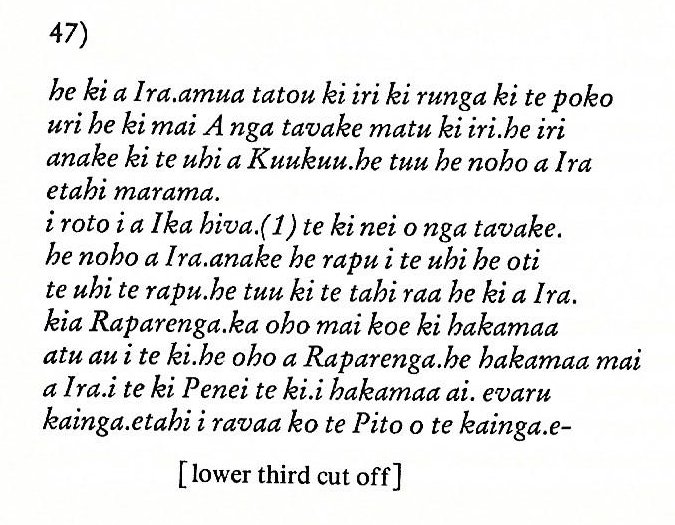
|
E:42 |
| ku noho era a a
Ira.i apina nui.i tuu mai |
Ira had
remained in Apina Nui and was there when Makoi
returned.
Ira gave the name 'Apina Nui A Papa Nihoniho A
Vere Nuanua A Papa O Rae' to the neck of the figure
of Hinariru. |
| ai.a a makoi.ki
apina nui.he nape e Ira |
| i te ingoa.ko
apina nui a Papa nihoniho |
|
a vere nuanua a Papa o rae i
te ngao o te |
|
moai o hinariru. |
|
Vere. 1.
Beard, moustache (vede G); vere gutu,
moustache; verevere, shaggy, hairy, tow,
oakum. Mgv.: veri, bristly, shaggy, chafed
(of a cord long in use). Mq.: veevee,
tentacles. Ta.: verevere, eyelash. 2. To weed
(ka-veri-mai, pick, cut-grass T); verevere,
to weed. P Mgv.: vere, to weed. Mq.:
veéveé, vavee, id. 3. Verega,
fruitful, valuable; verega kore, unfruitful,
valueless, contemptible, vain, futile, frivolous;
tae verega, insignificant, valueless; mataku
verega kore, scruple. Mgv.: verega, a
design put into execution; one who is apte, useful,
having a knowledge how to do things. 4. Ta.:
verevere, pudenda muliebria. Ma.: werewere,
id. (labia minora). Churchill. Sa.:
apungaleveleve, apongaleveleve, a spider,
a web. To.: kaleveleve, a large spider. Fu.:
kaleveleve, a spider, a web. Niuē:
kaleveleve,
a cobweb. Nukuoro: halaneveneve,
a spider. Uvea: kaleveleve,
a spider. Mgv.: pungaverevere,
a spider. Pau.: pungaverevere,
cloth. Mg.: pungaverevere,
a cobweb. Ta.: puaverevere,
id. Mao.: pungawerewere,
puawerewere,
puwerewere,
a spider. Ha.: punawelewele,
a spider, a web. Mq.: pukaveevee,
punaveevee,
id. Vi.: lawa,
a fishing net; viritālawalawa,
a cobweb; butalawalawa,
a spider. Churchill 2.
Nua.
1. Mother; this seems a more ancient word than
matu'a poreko. 2. Blanket, clothing, cape
formerly made from fibres of the mahute tree.
Vanaga. Cloak T. Churchill.
Nu'a 1.
Thick; piled one on top of the other, as
leis,
mats, or ocean swells; heaped; lush, thick-growing;
much traveled, as a road; multitude, as of people,
mass. Also hānu'a.
Moena kumu nu'a,
a sleeping mat made thick at one end to serve as a
head rest; lit. 'mat piled beginning'.
Nu'a
moena, a
heap of mats. Nu'a
kanaka, many people.
Haki nu'a ka uahi i
ke kai, the spray breaks in masses in the
sea. Ka nu'a o ka
palai, the thick clump of
palai
ferns. Ho'o nu'a,
to heap up; to give generously and continuously; to
indulge, as a child; surging, rising in swells, as
the sea. 2. A kind of seaweed. Nu'a-kea, a
goddess of lactation. Wehewehe.
Nuahine. 1. Old woman. 2. Ko te Nuahine
ká umu a ragi kotekote, ancient name of 'the
woman in the moon' inspired by the resemblance of
its landscape with the likeness of a woman sitting,
lighting the fire of her oven. Vanaga. Nuehine.
Old woman. Churchill. "[Englert
1948, 165:] '... se selia nombrar Ko te Nuahine
káumu à rangi kote kote que significa: La vieja
que enciende el curanto en el cielo kotekote.
Puedo haber sido una personificación de la luna
porque las viejos decían, comentando este nombre,
que no es una montaña que seve en la luna, sino una
mujer anciana que está suntada [sentada?] al lado un
gran curanto umu pae (de piedras en
circulo)." (Barthel) |
| ina kai hakamaa
Penei e ku naa ana te moai |
Nothing [ina
kai] at all was said, and thus [penei]
the figure and the ornament remained a secret [naa]. |
| te tuitui reipa. |
| he hoki he oho mai
arurua.he oo ki roto ki te ana |
The two
turned around, went on, entered [he oo ki roto ki]
the cave, and remained there.
Ira took [he too mai] the string (hau)
for making string-figures (kaikai) in order
to introduce [uru mo hakamaa] Makoi to the
game and help him gain knowledge of the content (urunga)
of the string-figures. |
| he noho.he too mai a
Ira.i te hau mo te kaikai |
| mo uru.mo hakamaa i
a Makoi.i te urunga o te kai(-) |
| kai. |
| Uruga.
Prophetic vision. It is said that, not long before
the first missionaries' coming a certain Rega
Varevare a Te Niu saw their arrival in a vision
and travelled all over the island to tell it:
He-oho-mai ko Rega Varevare a Te Niu mai Poike, he
mimiro i te po ka-variró te kaiga he-kî i taana
uruga, he ragi: 'E-tomo te haûti i Tarakiu, e-tomo
te poepoe hiku regorego, e-tomo te îka ariga koreva,
e-tomo te poporo haha, e-kiu te Atua i te ragi'. I
te otea o te rua raá he-tu'u-hakaou ki Poike; i te
ahi mo-kirokiro he-mate. Rega Varevare, son of
Te Niu, came from Poike, and toured
the island proclaiming his vision: 'A wooden house
will arrive at Tarakiu (near Vaihú), a
barge will arrive, animals will arrive with the
faces of eels (i.e. horses), golden thistles will
come, and the Lord will be heard in heaven'. The
next morning he arrived back in Poike, and in
the evening when it was getting dark, he died.
Vanaga.
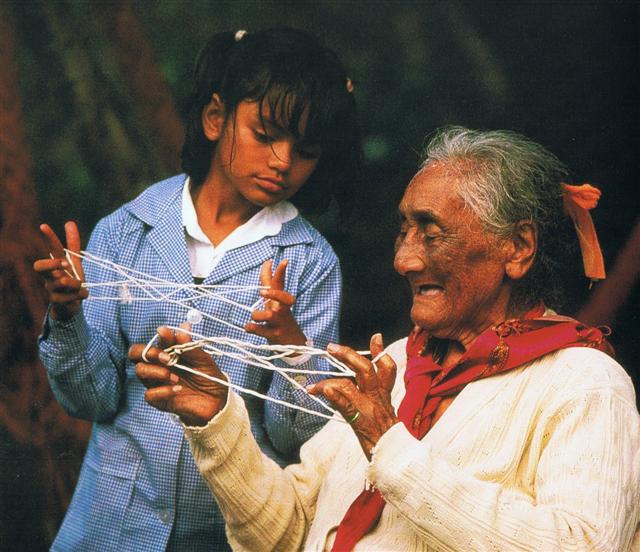 |
|
E:43 |
|
... string
games could be resumed after it was clear that the
Sun had managed to leave the horizon and was rapidly
gaining in altitude: 'Before the sun starts to leave
the horizon ... when it shows only on the horizon,
... then string games were no longer allowed as they
might lacerate the sun. Once the sun had started to
go higher and could be seen in its entirety, string
games could be resumed, if one so wished. So the
restriction on playing string games was only
applicable during the period between the sun's
return and its rising fully above the horizon ... |
| he uru a Ia.i te
kaikai.he hakaiti i te kai(-) |
Ira went
through (the forms of) the string figures and showed
them to Makoi. Ira said to Makoi, 'Now you recite (?
hoa mai) the verses (patautau) of
these string figures'.
[Two stone statues, erua moai, of Tuu
Hokorua:] (1) Ko Apina Iti
ko
Rapa Kura. |
| kai.kia Makoi.he ki
a Ira.kia Makoi ka |
| hoa mai koe i te
patautau o te kaikai nei.erua |
| moai a tuu hokorua
ko apina iti ko rapa kura. |
|
... |
|
E:46 |
|
hanga piko a hare
rutu manu a ana onoono |
Curved Bay
[hanga
piko], the house where
the bird beats (the rhythm), that is, where a
certain chant is being recited, Ana Onoono (a cave
well-suited as an overnight shelter), Pu Ngotangota
(a coastal formation where seawater is allowed to
flow in and out).
'Yours is the morning shadow' [ata popohanga toou]
refers to an area in Ata Hero where the house of
Ricardo Hero is now located. 'Yours is the evening
shadow' [ata
ahiahi toou]
belongs to a 'turtle' [honu].
'Apina Nui A Papa Nihoniho A Vere Nuanua A Papa O
Rae' was the neck [te
ngao]
of the figure of Hinariru. |
| a pu ngotangota.ata
popohanga toou e to ata |
| hero ē.ata ahiahi
toou e honu ē.apina |
| nui a Papa
nihoni(ho) a vere nuanua a Papa o rae. |
| i te ngao o te moai
o hinariru. |
|
Vere.
1. Beard, moustache (vede
G); vere gutu, moustache; verevere,
shaggy, hairy, tow, oakum. Mgv.: veri,
bristly, shaggy, chafed (of a cord long in use).
Mq.: veevee, tentacles. Ta.: verevere,
eyelash. 2. To weed (ka-veri-mai, pick,
cut-grass T); verevere, to weed. P Mgv.:
vere, to weed. Mq.: veéveé, vavee,
id. 3. Verega, fruitful, valuable; verega
kore, unfruitful, valueless, contemptible, vain,
futile, frivolous; tae verega, insignificant,
valueless; mataku verega kore, scruple. Mgv.:
verega, a design put into execution; one who
is apte, useful, having a knowledge how to do
things. 4. Ta.: verevere, pudenda muliebria.
Ma.: werewere, id. (labia minora). Churchill.
Sa.: apungaleveleve, apongaleveleve, a
spider, a web. To.: kaleveleve, a large
spider. Fu.: kaleveleve, a spider, a web.
Niuē: kaleveleve, a cobweb. Nukuoro:
halaneveneve, a spider. Uvea: kaleveleve,
a spider. Mgv.: pungaverevere, a spider.
Pau.: pungaverevere, cloth. Mg.:
pungaverevere, a cobweb. Ta.: puaverevere,
id. Mao.: pungawerewere, puawerewere,
puwerewere, a spider. Ha.: punawelewele,
a spider, a web. Mq.: pukaveevee,
punaveevee, id. Vi.: lawa, a fishing net;
viritālawalawa, a cobweb; butalawalawa,
a spider. Churchill 2.
Nua.
1. Mother; this seems a more
ancient word than matu'a poreko. 2. Blanket,
clothing, cape formerly made from fibres of the
mahute tree. Vanaga. Cloak T. Churchill. Nu'a
1. Thick; piled one on top of the other, as leis,
mats, or ocean swells; heaped; lush, thick-growing;
much traveled, as a road; multitude, as of people,
mass. Also hānu'a. Moena kumu nu'a, a
sleeping mat made thick at one end to serve as a
head rest; lit. 'mat piled beginning'.
Nu'a moena, a heap of mats. Nu'a
kanaka, many people. Haki nu'a ka uahi i ke
kai, the spray breaks in masses in the sea.
Ka nu'a o ka palai, the thick clump of palai
ferns. Ho'o nu'a, to heap up; to give
generously and continuously; to indulge, as a child;
surging, rising in swells, as the sea. 2. A kind of
seaweed. Nu'a-kea, a goddess of lactation.
Wehewehe.
Nuahine.
1. Old woman. 2. Ko te Nuahine ká umu a ragi
kotekote, ancient name of 'the woman in the
moon' inspired by the resemblance of its landscape
with the likeness of a woman sitting, lighting the
fire of her oven. Vanaga. Nuehine. Old woman.
Churchill. "[Englert 1948, 165:] '... se selia
nombrar Ko te Nuahine káumu à rangi kote kote
que significa: La vieja que enciende el curanto en
el cielo kotekote. Puedo haber sido una
personificación de la luna porque las viejos decían,
comentando este nombre, que no es una montaña que
seve en la luna, sino una mujer anciana que está
suntada [sentada?] al lado un gran curanto umu
pae (de piedras en circulo)." (Barthel) |
| he oti te Pautautau
nei |
Here the verses ended [he
oti]. |
|
Oti.
To come to an end; to suffice, to be enough:
ku-oti-á, it is finished; ina kai oti mo kai,
there is not enough to eat; he-oti á,
there isn't anymore left, it's the last one; it's
enough with that. Vanaga. Ta.: 1. Oti,
presage of death. Sa.: oti, to die. 2. To
cut. Mq.: koti, oti, id. Sa.: 'oti,
id. Ma.: koti, id. Churchill.
... hakatautau, to append.
P Pau.: fakatautau, to hang up. Mq.:
tautau, id. Ta.: faatautau, id. ...
kau-kau, to take counsel, to resolve, to chide,
to reprove, to explain, make clear ... tau-tau,
to hang, hang up ...
Pau.
1. To run out (food, water):
ekó pau te kai, te vai, is said when there is an
abundance of food or water, and there is no fear of
running out. Puna pau, a small natural well
near the quarry where the 'hats' (pukao) were
made; it was so called because only a little water
could be drawn from it every day and it ran dry very
soon. 2. Va'e pau, clubfoot. Paupau:
Curved. Vanaga. 1. Hakapau, to pierce (cf.
takapau, to thrust into). Pau.: pau, a
cut, a wound, bruised, black and blue. 2. Resin.
Mq.: epau, resin. Ta.: tepau, gum,
pitch, resin. (Paupau) Hakapaupau, grimace,
ironry, to grin. 3. Paura (powder),
gunpowder. 4. Pau.: paupau, breathless. Ta.:
paupau, id. 5. Ta.: pau, consumed,
expended. Sa.: pau, to come to an end. Ma.:
pau, finished. 6. Ta.: pau, to wet one
another. Mq.: pau, to moisten. Churchill.
Paua or pāua is the Māori name
given to three species of large edible sea snails,
marine gastropod molluscs which belong to the family
Haliotidae (genus Haliotis), known in
the USA as abalone, and in the UK as ormer shells
... Wikipedia |
| i te raa Po rae o
hora nui i iri ai ki runga |
... On the
first day of the month of September ('Hora Nui')
they went up to the yam plantation of Kuukuu |
|
ki te uhi a kuukuu. |
| i oho era mai Pu
Pakakina he tuu ki vai |
After they
had departed from Pu Pakakina they reached Vai
Marama and met [he piri] a man. Ira asked [he
ui a Ira], 'How many are you?' [hokohia koe].
He answered, 'There were two of us' [hokorua
Maua]. Ira continued asking, 'Where is [hē]
he
(the other)?' To that he answered, 'The one died.' [ku
mate ana]
Again Ira asked, 'Who has died?' [koai i mate]
He replied, 'That was Te Ohiro A Te Runu.'
Ira asked anew [he ui hokoou], 'And who
are you?' [koai koe] He answered [he ki
mai], 'Nga Tavake A Te Rona'. |
| marama he piri etahi
tangata.he ui a Ira. |
| hokohia koe.he ki
mai hokorua Maua |
| he ui hokoou atu a
Ira.hē ia.he ki hoko(-) |
| ou mai ku mate
ana.he ui hokoou |
| a Ira.koai i mate.he
ki mai.ko te ohiro |
|
a te runu.he ui
hokoou a Ira.koai koe he |
| ki mai.ko
nga
tavake.a te rona. |
|
Ga. Preposed plural marker of rare usage. 1.
Sometimes used with a few nouns denoting human
beings, more often omitted. Te ga vî'e, te ga
poki, the women and the children. Ga rauhiva
twins. 2. Used with some proper names. Ga Vaka,
Alpha and Beta Centauri (lit. Canoes). Vanaga.
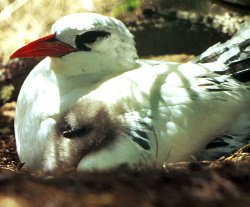
Rona. Figure made of wood, or stone, or painted,
representing a bird, a birdman, a lizard, etc.
Vanaga. Drawing, traction. Pau.: ronarona, to
pull one another about. Churchill. While the
rongorongo signs (rona) are generally 'carved
out, incised' (motu), ta implies an
incision ('cutting, beating') as well as the process
of applying signs to the surface with the aid of a
dye ... RAP. rona means primarily 'sign' (an
individual sign in the Rongorongo script or a
painted or carved sign made on a firm background,
such as a petroglyph), but also 'sculpture' (made
from wood or stone, representing animals of hybrid
creatures) ... rona (lona) implies the
idea of 'maintaining a straight line' with ropes and
nets and also the maintaining of a steady course (in
MAO. and TUA.). Te Rona is the name of a star
in TUA., which Makemson (1941:251) derives from the
mythical figure of 'Rona', who is connected
with the moon and is considered to be the father of
(the moon goddess) Hina (for this role in
MAO., see Tregear 1891:423). From west Polynesia
come totally different meanings. Interesting perhaps
is FIJ. lona, 'to wonder what one is to eat,
fasting for the dead.' ... Barthel 2
Thus Nga Tavake a te Rona (the Sign) could have referred
to Pollux (Polydeuces), whereas the existence of the mortal Castor
(Beaver) could have been only inferred. |
|
The dark night of the
moon was Ohiro.
Whiro
'Steals-off-and-hides'; also [in addition to the name of
Mercury] the universal name for the 'dark of the Moon' or
the first day of the lunar month; also the deity of sneak
thieves and rascals.
Makemson.
Runu. To take, to
grab with the hand; to receive, to welcome someone in one's
home. Ko Timoteo Pakarati ku-runu-rivariva-á ki a au i
toona hare, Timoteo Pakarati received me well in his
house. Runurunu, iterative of runu: to take
continuously, to collect. Vanaga. 1. To pluck, to pick, a
burden. 2. A substitute; runurunu, a representative.
Churchill. |
|
E:47 |
|
he ki a Ira.amua tatou ki iri ki runga ki te poko |
Ira said, 'Let's go! Let's all go up to the dark
abyss (i.e., the crater Rano Kau)!' |
|
Mua.
Front, before; used with prepositions a, i, o,
ki, mai; i mu'a i.., in front of..., etc.
Vanaga. The front, that which comes foremost; a
mau [mua?], before, ahead, to precede,
come on, forward; kapu a mua, oho a mua,
to go ahead; i mua, before, heretofore,
preceding; i mua atu, sooner; ki mua,
at first, before, to go before; ko mua, at
first, then, otherwile; o mua a mua, to march
at the head; o mua roa, the first. Churchill.
There were two of us, hokorua
Maua (E:46), ought to mean this pair was in
Front, presumably Gemini at the beginning of the
equinoctial year, the 'Canoes' Nga Waka.
The Maori word for
'the front of' is mua
and this is used as a
term to describe the past, that is, Nga wa o mua
or the time in front of us. Likewise, the word for
the back is muri
which is a term that
is used for the future. Thus the past is in front of
us, it is known; the future is behind us, unknown.
The point of this is that our ancestors always had
their backs to the future with their eyes firmly on
the past.
Vaka.
Canoe, small boat; vaka ama, outrigger canoe.
Vaka-ivi, graves under ahu which hold
skeletons (lit. 'bone canoe'). Vaka-ure, to
lay foundation stones in the outline of a canoe
(e.g. for hare paenga); nowadays used in the
more general sense, without reference to a special
shape of outline. Vanaga. Canoe, boat, bateau,
shallop, barge. Vakapoepoe (vaka -
poepoe) boat. P Pau.: vaka, canoe. Mgv.:
vaka, canoe, raft. Mq.: vaka, canoe.
Ta.: vaa, canoe, boat. Vakavaka,
narrow. Mq.: vakavaka, vaávaá, small,
fine, thin. Churchill. |
|
uri he ki mai A nga Tavake
matu ki iri.he iri |
Nga Tavake replied, 'Let's go up there.' |
|
A. 1. Prep.: for, over, by; a nei,
over here; a ruga, above; a te tapa,
by the side. 2. Genitive particle, used preceding
proper names and singular personal pronouns: te
poki a Mateo, Mateo's child; aana te kai,
the food is his. 3. Particle often used before nouns
and pronouns, especially when these are introduced
by a preposition such as i, ki; ki a îa, to
him, for him. Vanaga. Á. 1. Á or also just
a, article often used preceding proper names and
used in the meaning of 'son of...': Hei á Paega,
Hei, son of Paenga. 2. Very common abbreviation
of the particle ana, used following verbs:
ku-oti-á = ku-oti-ana; peira-á =
peira-ana. 3. (Also á-á.) Exclamation
expressing surprise or joy, which can also be used
as a verb: he-aha-koe, e-á-ana? what's
happening with you, that you should exclaim 'ah'?
He tu'u au e-tahi raá ki te hare o Eva i Puapae.
I-ûi-mai-era ki a au, he-á-á-mai, he-tagi-mai
'ka-ohomai, e repa ê'. one day I came to Eva's
house in Puapae. Upon seeing me she exclaimed: 'ah,
ah' and she said, crying: 'Welcome, lad'. Vanaga.
Possibly there is a wordplay on matua
(father, as in Hotu A Matua), intended to
convey the sense of how at that ancient time it was
not king Hotu who stood at the equinox but
king Tavake.
Tava.
Tavatava,
pale. Tavake,
sea bird, white, with rosy tail; its feathers were
used to decorate hats and belts. Vanaga. Mgv.: A
shellfish. To.:
tava-amanu, id.
Tavake, a
seabird with a long red tail. Mq.:
toavake,
toae, the
tropic bird. Sa.:
tava'e, id. Ta.:
Tavare,
to trick, to dupe. Mq.:
tavae, to cajole, to flatter. Ma.:
taware,
to dupe, to fool.. Mq.:
Tavatava, a fish. Sa.:
tavatava,
id. Ha.: kawakawa,
id. Churchill.
Tavari, the plant
Polygonum acuminatum
grows on the crater lakes in close association with
rushes and seems to have been used for medicinal
purposes. Barthel 2. |
|
anake ki te uhi a Kuukuu.he tuu
he noho a Ira |
They all went up to the yam plantation of Kuukuu.
Once they had arrived there, Ira stayed for one
month [etahi marama]. |
|
etahi marama. |
|
i roto i a Ika hiva.(1) te ki nei o nga tavake. |
(Ika Hiva is cited as the source of this tradition.)
[???] |
|
Ana Roto was a name for Spica. And if a
Beaver (Lat. Castor) could be referred to as
Kiore Hiva, then his immortal brother visible
up in the sky together with his father might have
been referred to as Ika Hiva.
...
Fish are actually unable to close their eyes, and
the fact that 'when the fish sleeps it does not
close its eyes' was noticed by ancient Indians. The
dot-in-a-circle similar to that occuring among the
trefoils of the Harappan priest-king's robe is
identical with the eye of the many small hare- and
fish-shaped amulets discovered on the lower levels
of Harappa ...
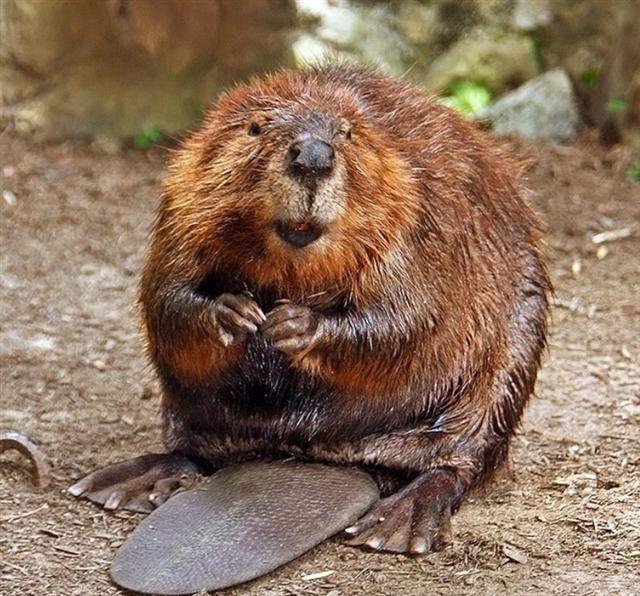
Kiore. Rat. Vanaga. Rat, mouse; kiore
hiva, rabbit. P Pau., Mgv.: kiore, rat,
mouse. Mq.: kioē,
íoé, id.
Ta.: iore,
id. Churchill. |
|
he noho a Ira.anake he rapu i te uhi he oti |
Ira and all the others [anake] stayed there [he
noho] and cleaned up the yam plantation. They
finished [he oti] weeding the yam plantation. |
|
Rapu.
Pau.: fata-rarapu, to dissolve. Mgv.: rapu,
to dilute. Ta.: rapu, to mix. Mq.: ápu,
to draw water. Churchill. Ha.: Lapu 1. Ghost
... apparition, phantom, specter; haunted; to haunt;
to act as a ghost. Ua
lapu ke keiki a kāua ia'u, I have been
haunted by our child.
Ho'o lapu, to pretend to be a ghost, as
children on Hallowe'en. 2. Haunted. Hale
lapu, haunted
house, not the Halloween variety. Kiliki o
lapu, trick or
treat. Wehewehe. Waving (of leafy branches). The
Eighth Land. Lapu, s.
Haw., ghost, apparition of some one dead,
night-monster; lapu-lapu, v. to
collect together in small heaps, to pick up, as
sticks for a faggot; lapu-wale, lit. 'only a
ghost', nothing substantial, foolish, worthless;
akua-lapu, a spectre. N. Zeal., rapu, to
search for. Tah., rapu, ta-rapu, to
mix together, squeeze, scratch, be in confusion.
Fiji, ravu, to kill, smash, break. Sanskr.,
ribhu, i.e., rabh-u (Benfey), name of
certain deities; according to Pictet, good spirits
in the Vedic mythology; rabh, to seize, to
take; rabhas, zeal. Lat., rabies,
rage, frenzy. Welsh, rhaib, fascination;
rheibus, a sorcerer, a witch. Touching the
Sanskrit rbhu, Pictet (Orig. Ind.-Eur., ii.
607) says: 'Leur nom comme adjectif, signifie
habile, adroit, inventif, et, comme substantif,
artisan habile surtout à forger et à construire des
chars. Il dérive de la rac. rabh, temere,
ægere, avec à préf., ordiri, incipere. Cf.
rbhva, rbhvan, hardi, entreprenant,
adroit. Lassen, le premier, a rapproché de
rbhu le
Grec 'Ορφευς,
tout en avouant que les traditions relatives au
chantre thrace n'offrent aucun rapport avec celles
du Rigveda. Kuhn adopte ce rapprochement, en
cherchant dans les Elfes de Germanie, grand amateurs
de musique et de chant, un châinon qui relie Orphée
aux rbhus de l'Inde. Si l'on part, en effet,
d'une forme arbh = rabh, dont le
dérivé rbhu serait un affaiblissement, il
devient facile d'y rattacher, avec Kuhn, , le scand.
älfr, ags. ælf, anc. all. alp,
&c., nom d'une classe d'esprits qui tiennent une
grande place dans la mythologie du Nord, et les
superstitions populair de l'Allemagne et de
l'Angleterre. Leurs attributs sont plus variés que
ceux de leurs confrères de l'Inde, et leur sphère
d'action est plus étendue. Ils se divisent en
plusieurs classes, les blancs, les noirs, les gris,
les bruns, suivant leur caractère bon ou malin; les
une beaux et grandieux, les autres laids et
difformes. Ces derniers se confondent plus ou moins
avec les nains, dvergar, qui se rapprochent
des rbhus par leur habileté comme artisans et
forgerons. D'un autre côté, les Alfar lumineux que
habitent l'air, et qui se plaisent à la musique et à
la dance, ressemblent mieux aux Maruts indiens,
génies de l'air qui, à leur tour, s'identifient par
plusieurs points avec les rbhus. On voit
ainsi qu'un fond commun de croyances, simple à son
origine, s'est développé plus tard dans plusieurs
directions chez les Indiens et les Germains.' And
also with the Polynesians. Fornander. |
|
te uhi te rapu.he tuu ki te tahi raa he ki a Ira. |
Another day dawned [he tuu ki te tahi raa],
and Ira said to Raparenga, 'Come here, you, so that
I can teach [hakamaa] you a verse (ki)!'
Raparenga came, and Ira taught him the verse. This [Penei]
was the verse he was taught: 'There are eight lands
[evaru kainga]. One has been discovered [etahi
i ravaa], namely, the little piece of earth (te
pito o te kainga). |
|
kia Raparenga.ka oho mai koe ki hakamaa |
|
atu au i te ki.he oho a Raparenga.he hakamaa mai |
|
a Ira.i te ki Penei te ki.i hakamaa ai. evaru |
|
kainga.etahi i ravaa ko te Pito o te kainga.e(-) |
|
Pito. 1.
Umbilical cord; navel; centre of something: te
pito o te henua, centre of the world. Ana
poreko te poki, ina ekó rivariva mo uru ki roto ki
te hare o here'u i te poki; e-nanagi te pito o te
poki, ai ka-rivariva mo uru ki roto ki te hare,
when a child is born one must not enter the house
immediately, for fear of injuring the child (that
is, by breaking the taboo on a house where birth
takes place); only after the umbilical cord has been
severed can one enter the house. 2. Also something
used for doing one's buttons up (buttonhole?).
Vanaga. Navel. Churchill. H Piko 1. Navel,
navel string, umbilical cord. Fig. blood relative,
genitals. Cfr piko pau 'iole, wai'olu.
Mō ka piko, moku ka piko, wehe i ka piko, the
navel cord is cut [friendship between related
persons is broken; a relative is cast out of a
family]. Pehea kō piko? How is your navel [a
facetious greeting avoided by some because of the
double meaning]? 2. Summit or top of a hill or
mountain; crest; crown of the head; crown of the hat
made on a frame (pāpale pahu); tip of the
ear; end of a rope; border of a land; center, as of
a fishpond wall or kōnane board; place where
a stem is attached to the leaf, as of taro. 3. Short
for alopiko. I ka piko nō 'oe, lihaliha
(song), at the belly portion itself, so very
choice and fat. 4. A common taro with many
varieties, all with the leaf blade indented at the
base up to the piko, junction of blade and
stem. 5. Design in plaiting the hat called pāpale
'ie. 6. Bottom round of a carrying net, kōkō.
7. Small wauke rootlets from an old plant. 8.
Thatch above a door. 'Oki i ka piko, to cut
this thatch; fig. to dedicate a house. Wehewehe. |
|
(lower third cut off) |
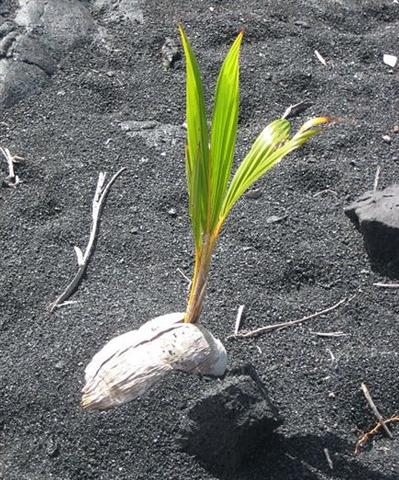
|